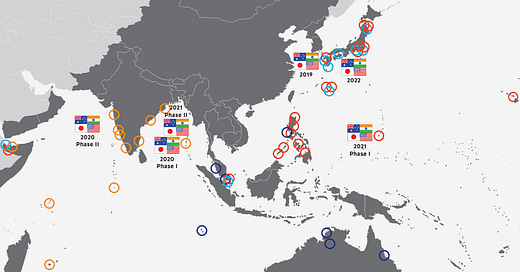Since its first formation in 2007, the Quadrilateral Security Dialogue or "Quad" of the Australia, India, Japan and the United States of America has continued to evolve in to something that isn't a fully formed alliance, but is a bit more than just a talking shop as well.
Encouraged by the changing nature of the People's Republic of China, it is evolving in to something with great potential for enhancing security and international norms at sea to the benefit of not just the Quad, but the other nations in the area.
For the full hour today to discuss the Quad will be returning guest Blake Herzinger.
The foundation for our discussion will be via the Unites States Study Centre, Bolstering the Quad: The case for a collective approach to maritime security.
Blake is a Research Fellow in the Foreign Policy and Defence Program at the United States Studies Centre. His work is broadly focused on Indo-Pacific defence policy and US security cooperation, with emphasis on maritime security and sea power.
Previously a Non-resident Fellow at the American Enterprise Institute, Blake also directed global security policy for Twitter, and was a Non-resident WSD-Handa Fellow and Young Leader at Pacific Forum. Prior to that, Blake was a civilian adviser to the US Pacific Fleet, focusing on maritime security cooperation in Southeast Asia, South Asia, and the South Pacific. During that time, he and his team developed the Indo-Pacific Maritime Security Initiative program, delivering assistance ranging from coursework to coast guard cutters to regional maritime law enforcement organisations. He is a serving US Navy Reserve foreign area officer and spent ten years in active service.
His work can be found in Foreign Policy, War on the Rocks, The Diplomat, The Straits Times and Nikkei Asia, among other publications. His book, Carrier Killer, focuses on China’s anti-ship ballistic missile program and its influence on the regional military balance. Blake holds an MSc in Strategic Studies from the S. Rajaratnam School of International Studies (RSIS) at Nanyang Technological University, and completed his BA in Political Science at Brigham Young University.





The map assumes India is an ally against China. I wouldn't make that assumption. Worse it assumes this "alliance" enhances security. I wouldn't draw that conclusion. It may lead to an arms race that undermines security and leads to war. After our amazing victories in Iraq and Afghanistan and the Ukrainian counteroffensive breakthrough to the Azov Sea I guess it's time to move on to China.
India is still in the Sino-Russian orbit economically and diplomatically. It will take a lot of fiscal and diplomatic investment to get them on-side.